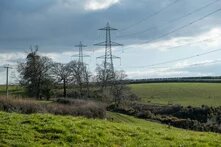No one knows whether Labour will repeal some of the draconian anti-protest laws passed in recent years in the UK, writes David Mead. But it is unlikely to be a priority for a party worried about alienating the press and with a failing welfare state to fix.

The past couple of years in the UK have been frantic for protest lawyers. Parliament passed two major pieces of legislation, the Police Crime Sentencing and Courts Act (PCSCA) in 2022 and the Public Order Act (POA) in 2023. More additions are planned in the Criminal Justice Bill, which is currently making its way through Parliament. It is no surprise that these bills are all one-way traffic, imposing greater restrictions on protesters and activists — either by adding yet more offences to the statute book or by increasing the powers of the police to regulate marches and assemblies.
What we don’t know is whether Labour, if it is elected, will retain this raft of new crimes and new powers. What follows is speculation. We are in the middle of formal manifesto pledges and campaigning, but some indications of the direction of travel are in the party’s 116-page Labour National Policy Forum discussion document, such as its flagship policy “Green and Digital Future”.
Understandably, Labour’s domestic priorities will be elsewhere as it seeks to remedy years of underfunding for essential public services. However, little of that requires much parliamentary time. How will Labour use what is likely to be a large parliamentary majority to alter the human rights and home affairs landscape?
Ministers are likely to be kept busy with prison reform, buttressing police personnel and capacity, and with legal aid and access to justice. Constitutionally, we know that Labour is long committed to retaining the domestic Human Rights Act and remaining within the European Court of Human Rights and Council of Europe. Nationally, so are the Liberal Democrats and Greens. Perhaps we shouldn’t read too much into Labour’s current reluctance to undo the substantial erosion into the right to protest. So intensely hostile is the coverage of Just Stop Oil and XR “slow walking” protests that to show any support for political activism, especially environmental protests, in the build-up to an election risks the fury of the British media.
Mixed messages
David Lammy, Labour’s shadow foreign secretary, put it (on his LBC radio show) when asked about Labour’s position on the recent protest laws: “We can’t come into office, picking through all the Conservative legislation and repealing it. It would take up so much parliamentary time. We need a positive agenda.” Labour had voted against the PCSCA 2022 at second reading in the Commons – the main chance MPs have to vote a whole bill down on a matter of principle, rather than tweaking it by voting in favour of or against specific clauses or amendments – largely because, in its view, the wider provisions about crime and sentencing did not address on the real concerns and did not go far enough on others, rather than because of the impact of the provisions on protest. Labour also voted against what became the POA 2023 solely because the new offences and powers either replicated existing ones (and so were otiose) or were disproportionate and risked “bringing peaceful protesters unnecessarily into the criminal justice system.”
Stepping back, however, we can see a different picture. First, in the Lords – the scrutinising but unelected chamber – Labour fell behind the Liberal Democrats and Greens in opposing some government amendments that sought to extend yet further police powers during the legislative process, or they proposed their own motions with lesser effect on the legislation as it passed through. Labour argued that the traditional constitutional balance of power between elected MPs and unelected Lords required that if the Commons had passed a proposal (as it had) it was not for the Lords to stymie it.
While superficially attractive, this ignores the fact that the proposal here was not contained in a bill and therefore was not in a piece of primary legislation, to which this parliamentary convention applies. Instead, it was a piece of secondary, subordinate legislation and as a result was subject to far less detailed scrutiny. Indeed, an amendment with exactly the same wording had been voted down in primary legislation just weeks earlier.
Secondly, the National Policy Forum reports show Labour is committed to only marginal changes in the POA 2023 laws. Labour does not plan to row back on – for example – the introduction of an ex ante policing regulatory power based simply on likely significant or serious disruptive noise, which I earlier termed “an existential threat” to the right to protest.
In evidence to a parliamentary committee, senior police officers did not suggest they needed such a power – yet Labour is not committing to repeal it. They only intend to repeal powers related to suspicionless stop and search and the offence of being equipped to lock on. There is nothing on, say, the power to impose what are in effect “protester banning injunctions”, Serious Disruption Prevention Orders, which came into force in early April and have been criticised for vagueness, arbitrariness and disproportionality. That Labour is also committed to monitoring and examining the impact of the legislation and gathering evidence to support change does not detract from the inroads into the right to protest that the party is seemingly prepared to accept.
Rights and freedoms, up to a point
Senior Labour politicians are usually very quick to distance themselves from others in their own party who express any sympathy with more disruptive forms of protest and protester, or are castigated if they are too slow to do so, as work by my PhD student Suzanne Dixon shows. Her thesis examines media coverage and framing of XR between 2019 and 2021. These responses do not fill us with hope.
Over the past 20 years or so, Labour has had a strange love-hate relationship with rights and freedoms. A major entry on the credit side was the Human Rights Act in 1998, which was part of a quartet of constitutional reform by the first Blair government, alongside Lords reform, devolution, and freedom of information. We would think too of the recognition of gender reassignment, civil partnerships, and rights for workers for the first time to be paid a minimum wage. Against that, its 13 years in power led to the Identity Cards Act 2005 (repealed by the coalition), and Labour’s restrictions on demonstrations near Westminster. We might add the expansion of police powers to keep and retain DNA samples in 2001, introducing the sub-criminal anti-social behaviour orders (ASBOs) in 1998, indefinite detention without trial of international terrorist suspects by executive fiat (which was ruled a breach of the ECHR by the Supreme Court in 2004) as well as an unsuccessful attempt (in 2005) to allow the police up to 90 days to question suspects without charge.
Which Keir Starmer will turn up in government? The human rights lawyer who acted pro bono for Helen Steel and Dave Morris in their Strasbourg libel case against McDonalds, and who as Director of Public Prosecutions in 2012 introduced the first prosecution guidance, most notably setting out that a prosecution was less likely in the public interest where a public protest was essentially peaceful? Or the one who recently backed longer, 51-week jail sentences for those who block roads? Only time will tell.


